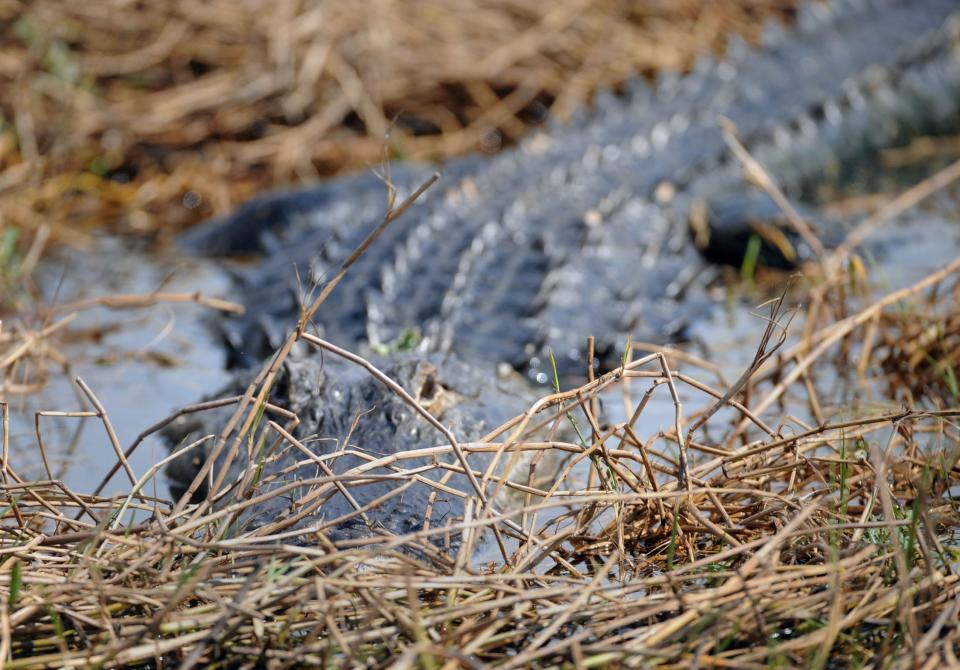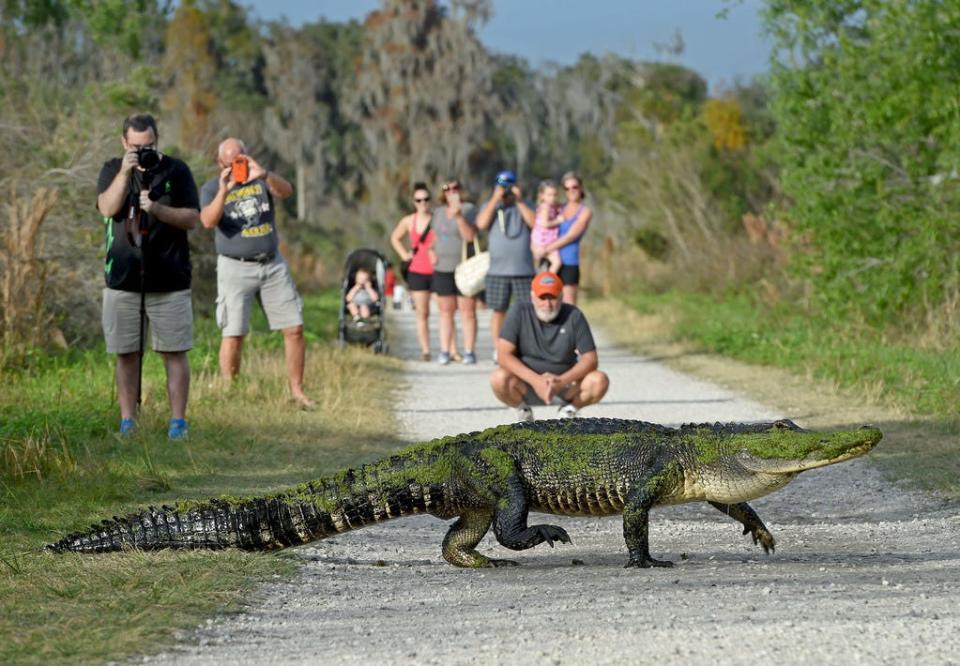Among the state's most alligator-infested lakes, Polk County shows up a lot. Surprise? Nah
Polk County residents are no stranger to alligators. They seemingly inhabit every water-filled hole.
More than 1 million alligators call the state of Florida home, but where do they live?
Each year, the Florida Fish and Wildlife Conservation Commission takes a census of 50 alligator-infested places in Florida to gauge how many alligators are living in the state. The FWC says it enlists the help of scientists and biologists who go out on airboats at night to count how many glowing sets of red eyes they see floating on the water.
Counting every gator is not possible, so the exact count and some math magic are used to estimate what the total population likely is for some lakes.
Surprisingly, only one lake in the state's top 5 touches Polk County. But eight of the top 30 are either in Polk or run alongside its border.
If you live in Florida, you likely know you have to coexist with alligators. So long as you keep your distance and never feed one if it crosses your path, you should be fine.
There are, however, risks, especially when it comes to water. The largest and most alligator-infested lake in the state has more than 9,000 alligators confirmed to be living in it, with another 21,000 estimated to be lurking in the same water.
Top 5 Florida lakes with the most alligators
Here is a list of the five most gator-infested lakes in the Sunshine State, according to A-Z Animals blog:

Lake Okeechobee: 9,308 counted alligators with an estimated population of about 30,000. Lake Okeechobee is Florida's largest freshwater lake and borders Palm Beach County, Martin County, Glades County, Okeechobee County, and Hendry County. It's about 30 miles from Lake Okeechobee or "Lake O" to Port St. Lucie, Florida.
Orange Lake: 2,732 alligators. Orange Lake is in Alachua County and about 20 miles to Gainesville. Coincidentally, the University of Florida mascot is an alligator, the school is home to the Florida Gators, and its colors are orange and blue.
Lake George: 2,660 alligators. Lake George, or Lake Welaka to some, is in Volusia County on the St. Johns River, north of Orlando and south of Jacksonville. It's about 15 miles from Crescent City, Florida.
Lake Jesup: 2,414 alligators with an estimated population as high as 13,000. Lake Jesup is in Seminole County and about 12 miles from Orlando Sanford International Airport.
Lake Kissimmee: 2,065 alligators. Lake Kissimmee is in Osceola County and Polk County and about 20 miles from Lake Wales, Florida. Though Kissimmee is in its name, Lake Kissimmee is about 55 miles away from Kissimmee, Florida.
Top 10 most alligator-infested lakes in the U.S. Psst, Florida is in there, a lot
In November 2023, A-Z Animals listed the Top 10 lakes in the U.S. that contain alligators. Florida made the list ? a lot.
Florida:
Lake George, Lake Jesup, Alligator Lake, Lake Kissimmee, Lake Okeechobee, Lake Poinsett, Sawgrass Lake
Louisiana:
Caddo Lake, Cypress Lake
Texas:
Lake Lewisville
And ... the lakes with the most alligators in Polk County?
Among the state's 30 top homes for alligators, Polk County shows up a lot — eight times to be exact. Here's a look:

Lake Kissimmee, with an estimated 2,065 alligators, ranked fifth on the state list. Technically, the 31,000-acre lake sits in Osceola County … well, the Osceola-Polk line. But many of its access points are in Polk County, including Lake Kissimmee State Park.
Lake Hatchineha was seventh on the state list with an estimated 1,287 alligators. Part of the Kissimmee Chain of Lakes, the 5,872-acre Lake Hatch also sits in Osceola, though its only direct, public access point is in Port Hatchineha in Polk County.
Lake Hancock, a 4,584-acre lake situated east of U.S. 98 and south of Winter Lake Road between Lakeland and Bartow is 13th on the state list with an estimated 559 alligators. Anyone who’s visited Circle B Bar Reserve on the lake’s north shore or rambled along Panther Point Trail on its east side might find the number hard to believe. Alligators seem to be everywhere, and photos of its most famous residents meandering across trails often make a national splash.
Lake Pierce is a 3,856-acre lake just north of Lake Wales and west of the Allen David Broussard Catfish Creek Preserve. It comes in 18th on the state list with an estimated 314 alligators.
Lake Marion, a 3,021-acre lake between Poinciana and Haines City in Polk County’s far east, is 19th on the state list with an estimated 275 alligators.
Lake Weohyakapka, also known as Lake Walk-in-Water, is a 7,528-acre lake just west of Indian Lake Estates in far eastern Polk County. It’s 22nd in the state with an estimated 195 alligators.
Lake Arbuckle, a 3,809-acre lake just a little south of Weohyakapka, is ranks 23rd in the state with 168 alligators.
Last but not least: Watch out for your pets if you live near Lake Dexter. This lake in the heart of Winter Haven, just across the street from Legoland Florida, is the smallest on the top 30 list at 147 acres. It ranked 24th on the state list with 166 alligators – more than one per acre. Only one lake among Florida’s top 30 had a higher density of these prehistoric beauties – the 1,194-acre Lake Jesup in Sanford with 2.02 alligators per acre.
Safety tips: What to do if you see an alligator?
Though Florida residents have learned to coexist with alligators, the potential for conflict always exists, according to the Florida Fish and Wildlife Conservation Commission. The wildlife commission recommends people avoid feeding alligators and to keep your distance if you see one. "Swim only in designated swimming areas during daylight hours. And keep pets on a leash and away from the water," FWC's site states.
Serious injuries caused by alligators are rare here, but if you are concerned about a gator, call the nuisance alligator hot line at 866-392-4286 or visit myfwc.com.
How do you escape an alligator attack? What is the best way to get away from a gator?
Native Floridians learn as early as preschool to run away in a zig-zag line upon encountering a gator, but this has actually been debunked. Gators can run fast on land, but only in short distances before they get tired. Simply run away in a straight line.
If you find yourself tempted to take a night swim in a lake, river, pond or any natural body of fresh water, just don't. If the sun is down, the gators are out.
If you're walking or relaxing beside a lake, pond or river with your dog or cat, keep them at least 10 feet away from the shore and on a leash.
This should go without saying, but never feed an alligator. You definitely don't want this wild animal to associate you with food.
Can you shoot an alligator in your yard in Florida?
Don't try to "take care" of any gators yourself. If you don't have a permit to be hunting gators, you can't shoot one. And, depending on where you live, just by firing gun you may be breaking other local laws.
Under Florida law, it's a third-degree felony to "intentionally kill, injure, possess or capture, or attempt to kill, injure, possess or capture an alligator or other crocodilian, or the eggs of an alligator or other crocodilian, unless authorized by rules of the commission."
The Statewide Nuisance Alligator Program trappers relocate gators under 4 feet long and kills nuisance gators that are longer than 4 feet.
"Relocated alligators often try to return to their capture site," according to the SNAP website. "They can create problems for people or other alligators along the way. If an alligator successfully returns, capturing it again would be necessary and likely more difficult the second time."
This article originally appeared on The Ledger: What are Polk's most alligator-infested lakes? You might be surprised